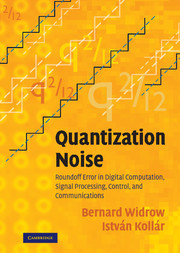 Quantization Noise
Quantization Noise Book contents
- Frontmatter
- Contents
- Preface
- Acknowledgments
- Glossary of Symbols
- Acronyms and Abbreviations
- Part I Background
- Part II Uniform Quantization
- Part III Floating–Point Quantization
- Part IV Quantization in Signal Processing, Feedback Control, and Computations
- 15 Roundoff Noise in FIR Digital Filters and in FFT Calculations
- 16 Roundoff Noise in IIR Digital Filters
- 17 Roundoff Noise in Digital Feedback Control Systems
- 18 Roundoff Errors in Nonlinear Dynamic Systems –A Chaotic Example
- Part V Applications of Quantization Noise Theory
- Part VI Quantization of System Parameters
- APPENDICES
- Bibliography
- Index
18 - Roundoff Errors in Nonlinear Dynamic Systems –A Chaotic Example
from Part IV - Quantization in Signal Processing, Feedback Control, and Computations
Published online by Cambridge University Press: 06 July 2010
- Frontmatter
- Contents
- Preface
- Acknowledgments
- Glossary of Symbols
- Acronyms and Abbreviations
- Part I Background
- Part II Uniform Quantization
- Part III Floating–Point Quantization
- Part IV Quantization in Signal Processing, Feedback Control, and Computations
- 15 Roundoff Noise in FIR Digital Filters and in FFT Calculations
- 16 Roundoff Noise in IIR Digital Filters
- 17 Roundoff Noise in Digital Feedback Control Systems
- 18 Roundoff Errors in Nonlinear Dynamic Systems –A Chaotic Example
- Part V Applications of Quantization Noise Theory
- Part VI Quantization of System Parameters
- APPENDICES
- Bibliography
- Index
Summary
Scientific computation is done these days with floating–point arithmetic. Generally double precision is used. Of concern are quantization effects in the solutions of equations caused by limited precision in the representation of dependent variables (equation solutions) and limited precision in the representation of coefficients (equation parameters).
The full scope of the issues raised here is so great that it would be impossible to encompass it all in a single chapter. There are too many different kinds of equations to be dealt with. Some are linear, some nonlinear. Some have a unique solution, some have solutions of many values such as sampled time functions. Some have driving functions, some are homogeneous with given initial conditions. Some have feedback from the output to decrease the error, some are open–loop. Some have a single input and a single output, some have many inputs and many outputs, etc.
In this brief chapter, we will employ what we have learned about floating–point quantization to analyze roundoff errors in a nonlinear system. The ideas will be developed by studying a few simple cases. It is hoped that the reader will be able to use these ideas in solving new and unusual problems.
Information
- Type
- Chapter
- Information
- Quantization NoiseRoundoff Error in Digital Computation, Signal Processing, Control, and Communications, pp. 465 - 482Publisher: Cambridge University PressPrint publication year: 2008